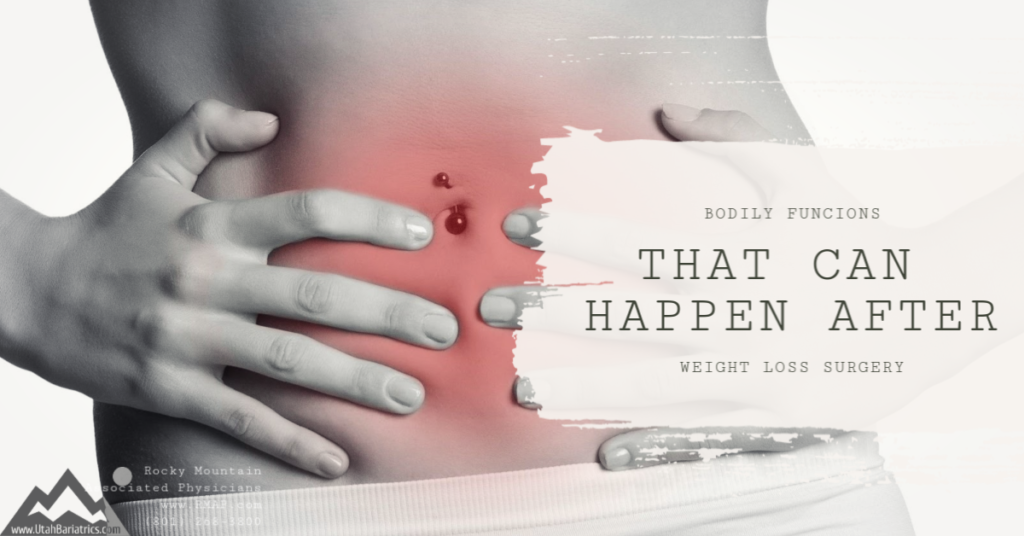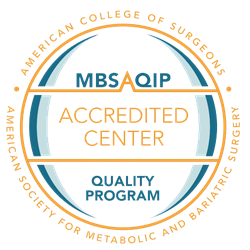
Learn more about weight loss surgery at Rocky Mountain Associated Physicians www.RMAP.com (801) 268-3800
There is no adequate way to prepare weight loss surgery patients for the variety of changes they will experience after surgery. Not only do patients see fast results within the first yet, they see the pounds fade away, clothing feeling looser, and their medication lists shrink. There is, of course, the bad that goes along with all of the good. Certain things like bodily functions; mentally and physically.
Therefore, it’s the old law of input and output, less in equals less out.
Hydration after surgery is so important to remember. Decreased fluid in your body leads to constipation. Constipation is common and can be relieved by increasing your water intake and using two tablespoons of Milk of Magnesia no more than twice a week following the first week post-op. Excessive use of laxatives such as Milk of Magnesia could result in dependency, which can result in long-term difficulties with your bowels.
Your first course of action if you are experiencing constipation is to increase your water intake. Sip frequently, and carry a water bottle with you at all times. Proper hydration is important for healthy bowel function. If you are having ongoing problems with your bowel, please contact your surgeon’s medical assistant.
For DS Patients: If you are experiencing constipation after surgery, it’s important to let your surgeon know. Diarrhea can also be common after surgery, and so it’s very important for you to stay hydrated. If you are having ongoing problems with your bowel, please contact your surgeon’s medical assistant.
You should be drinking a minimum of 64 ounces of water each day. Under average circumstances the body loses and needs to replace approximately two to three quarts of water daily. Breathing, urinating, defecating, perspiring and sneezing all are causes of water loss. Water is essential for weight loss and for appropriate energy levels. One suggestion is to drink 16 ounces of water on your way to work if you have a thirty-minute drive. Drink 16 ounces of water on your way home. This is half of your daily water drinking requirement. You can add in the other 32 ounces between your three meals. Or you can try freezing a water jug and carrying it with you while you sip it frequently. Staying hydrated will help you stay energized and have regular bowel movements. Fatigue is often an early symptom of dehydration. Make drinking a priority in your life. Americans often mistake hunger for thirst. Increase your water intake if you find you are having difficulty with grazing.
For more information on hydration and dehydration, go here and here and here.
The percentage of postoperative patients that we see with a bowel obstruction is less than 5%. A bowel obstruction can be defined as interference with the normal passage of intestinal contents through the small and/or large bowel caused by partial or complete obstruction. This obstruction is usually caused by adhesions (scar tissue).
Symptoms can include: bloating or distention in the abdominal area, bowel cramping, abdominal pain, vomiting, constipation and/or diarrhea. If you have any severe abdominal cramping and/or pain that continues for up to six hours, especially accompanied by any of these other symptoms, it is crucial that you call our office and talk to your surgeon’s medical assistant. If you are calling after office hours, the answering service will page the doctor immediately. When you’re in doubt, you can always go straight to the emergency room. Please have them contact your surgeon here at RMAP. They are experienced on how best to handle your care in this area (even if it has been a number of years since your surgery). It is much better to call if you are having any of the above symptoms, than to let time go by. Time is critical in curing a bowel obstruction. The more time that a bowel obstruction goes untreated by medical personnel, the high the chances of it causing a major problem for you, including death. When in doubt…call!
When experiencing diarrhea, the first thing to do is to eliminate any kind of consumption of carbohydrates or sugars, including fruits and fruit juices. Dietary fats may also contribute substantially to foul smelling gas and diarrhea. Make sure you are taking probiotics at each meal. Keep your fluid level elevated to compensate for the extra fluid loss. If there is no improvement, please contact your surgeon.
Gas is often produced by also consuming too many complex carbohydrates. Certain foods are gas-producing such as: broccoli, cauliflower, and onions. Extra air taken in with chewing gum or using a straw can also cause a gassy stomach. If you are feeling symptoms of gas, try increasing your exercise and eliminating gassy foods.
Having a nasty taste in your mouth or having really bad breath is very common. Rapid weight loss causes this. Use mouthwash and brush your teeth frequently. Please be aware that chewing gum can cause excess air swallowing and can cause a gassy stomach.
Dumping Syndrome is a group of symptoms that occur when the undigested contents of your stomach are transported or “dumped” into your small intestine too rapidly. Some symptoms are nausea, dizziness, feeling weak and generally ill (enough to make you need to lie down), heart racing (increase in your pulse), feeling hot and perspiring, vomiting, cramping, and/or diarrhea. Types of foods that can cause dumping include those that contain high amounts of sugar like ice cream, malts, candy, or foods that contain too much fat (like fried food).
The “dumping syndrome” is your body’s way of telling you what it does not agree with. More importantly, it reminds you of what you do need to be eating to implement a healthy nutrition lifestyle. Listen to your body!
For more information on Dumping Syndrome, go here.
Hair loss after surgery is not uncommon either. It usually starts to happen around four to six months post-op. When a patient has major surgery, anesthesia, or loses a large amount of weight in a rapid time period, it results as a major stress to the body. The body’s primary order of business is to protect vital organs. Hair growth is a secondary bodily function. If you are eating protein at each meal (70% of your meal) and are taking your vitamins, then do not worry. It will stop. Typically, a patient does not lose more than one third of their hair. Most patients notice that their hair growth returns in several months. Adequate protein and vitamins are essential. Check with your surgeon.
For more information on hair loss, go here.
Some patients may experience pain or vomiting after eating food. In more instances, this is caused by eating too much and/or too fast. If eating is slow and calm, you will learn to listen to the signals from your stomach pouch. Call your surgeon’s medical assistant if you feel nauseated, have pain, or do vomit after eating.
Regular vomiting is a warning sign of obstruction. Initially, vomiting may be caused by swelling at the operative site. Later, there is a possibility that vomiting might be caused by a formation of a stricture, scarring of the outlet of the gastric pouch to the small intestine, ulceration, or by an obstruction of the pouch outlet by a lump of poorly chewed food, tablet, or other foreign body.
In most cases, vomiting related complications can easily be corrected without additional surgery. However, re-operation or simple dilation of the outlet may be required.
A large part of changing your behavior is recognizing head hunger. Culture and environment have conditioned us to eat for a variety of reasons. We eat during the holidays, when we are happy, depressed, angry, bored, anxious, and in many types of social settings. Eating for nutrition plays only a small part in the reasons individuals eat. “Head hunger” results when an individual wants to eat for any reason other than being hungry. Remember when you feel or think of the need to eat, just for the pleasure of eating, remind yourself that you eat for nutritional purposes only.
When head hunger hits you, develop a strategy to avoid this behavior. The best way may be to simply drink water. You can also go for a walk, read a book, learn a new hobby, or clean your house. Do anything that will divert you from old patterns of eating that have no relation to nutrition. The sensation will be short lived, but the satisfaction of not giving into temptations will be much greater.
Try also to develop an “emergency kit” filled with disaster diversion ideas/activities that you can go to so you will avoid raiding the kitchen. Ideas include finding a book at the library, or going into a room and finding things to throw away. Make them fun, creative, and easy to do right at that moment of weakness.
For more information on “Head Hunger,” go here.
Weight loss plateaus are also very common when your body has stopped losing weight for a period of time. This happens to almost all patients at one time or another. If you have had excess weight for a number of years, losing a large amount of weight will be a major stress to the body. Imagine your body saying, “Hey, wait a minute, I’ve shed enough pounds. I need to stay here for a while and get used to this.”
Sometimes your body will plateau at a weight you maintained previously for a number of years. Never fear, this too shall pass. Just adhere to the guidelines. Some suggestions for dealing with a plateau are:
- Realize that this will not be permanent
- Make sure you are drinking an adequate amount of water (minimum 64 ounces/day)
- Eat foods that are within the guidelines (proteins/vegetables)
- Look for hidden carbohydrates and sugars in food by reading nutrition labels
- Exercise to the point that you have perspiration on your brow
- Make sure you are getting adequate sleep (7-8 hours a night)
- Make sure you are taking your daily multivitamin, calcium citrate, sublingual B-12
- Keep a food diary and write down everything you eat
To go along with rapid weight loss, some patients have an excess of skin in the abdomen, thigh, chest, breast and/or upper arm areas after losing a large amount of weight. Sometimes exercise does not help these areas tone up as much as you would like to see them toned. If you desire, you may call our office and ask for recommendations for current plastic surgeons. Many patients elect to have one or more of the following procedures done after their weight loss:
- Abdominoplasty/panniculectomy (tummy tuck)
- Breast augmentation, reduction and/or lift
- Removal of excess skin from arms and thighs
- Scar revision
Be sure you are exercising regularly, taking your vitamins, following the nutritional guidelines, and keeping up on your annual bloodwork and follow up appointments. Should you have any medical/food questions or concerns, please be sure to call our office at (801) 268-3800 and talk with your surgeon’s medical assistant.
Find more answers to Frequently Answered Questions here.
www.RMAP.com
Rocky Mountain Associated Physicians
801-268-3800
1160 East 3900 South, Suite 4100
SLC, UT 84124













 Address: 1521 East 3900 South STE 100
Address: 1521 East 3900 South STE 100 Office: +
Office: +  Fax number (801) 268-3997
Fax number (801) 268-3997 Email: info@rmapinc.com
Email: info@rmapinc.com



